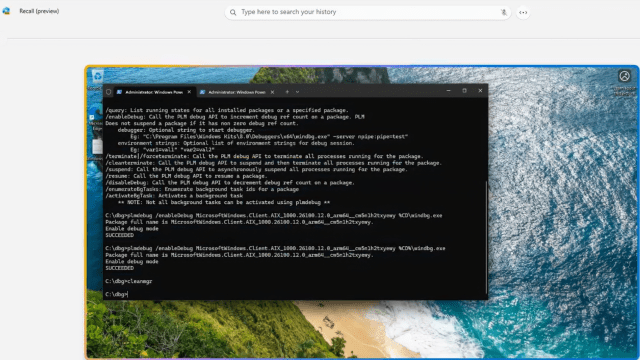- Windows 11’s new Copilot+ feature, Recall, doesn’t require a powerful NPU for operation.
- Recall’s functions include automated screen captures and text extraction, tasks manageable by modern hardware.
- Performance without an NPU might see improvement due to reduced overhead, as suggested by tests.
- Microsoft’s stringent hardware requirements raise questions about the necessity of such limitations.
- The strategic imposition of artificial restrictions serves as a marketing tactic for Windows 11’s “AI PC” features.
- @thebookisclosed’s testing reveals compatibility with both Arm64 and x86-64 CPUs.
- The revelation highlights the performance gap between the hype and reality of “AI PC” features.
Main AI News:
In the midst of the fervent debate surrounding the introduction of the new Copilot+ features in Windows 11, a revelation on Twitter has added a new layer to the discussion. According to a developer, one of the flagship features of Windows 11, Recall, does not necessitate the presence of a robust Neural Processing Unit (NPU). This disclosure sheds light on the underlying technology driving Recall, which primarily revolves around automated screen captures and text extraction from these captures — functionalities well within the capabilities of modern hardware.
The pertinent question arises: can these tasks be executed with comparable efficiency sans an NPU? Insights shared by @thebookisclosed suggest that the observed sluggish performance, as depicted in accompanying videos, could be attributed in part to concurrent screen recording processes. Therefore, it’s plausible that without this overhead, the performance might witness an uptick.
While the prospect of harnessing a potent NPU for enhanced performance remains tantalizing, the revelation prompts contemplation on Microsoft’s rationale behind imposing stringent hardware requirements. With contemporary consumer GPUs from AMD and Nvidia boasting AI cores, capable of handling such workloads, one wonders about the necessity of these restrictions. Even though certain features like Automatic Super Resolution have justifiable limitations, the absence of AI upscaling hardware in earlier iterations of AMD FSR and Intel XeSS renders it an optional requirement rather than a prerequisite.
It appears that the imposition of artificial limitations might serve as a strategic marketing tactic for Windows 11, accentuating its purported “AI PC” and associated technical advancements. This strategy isn’t novel, as evidenced by previous instances such as the testing of Auto HDR in Windows 10 preview builds before its exclusivity to Windows 11. Such decisions often evoke discontent among users, echoing sentiments of missed opportunities and unmet expectations.
However, amidst these deliberations, credit must be accorded to @thebookisclosed for their commendable efforts in unveiling this aspect. While the testing primarily centered around “current-gen Arm64 hardware,” assertions regarding its compatibility with x86-64 CPUs from Intel and AMD offer hope for broader accessibility. This revelation underscores the disparity between the hype surrounding “AI PC” features and their actual performance, compelling a reevaluation of Microsoft’s approach to hardware requirements and feature limitations.
Conclusion:
The revelation that Windows 11’s Recall feature can operate without a powerful NPU challenges Microsoft’s stringent hardware requirements. This may prompt a reevaluation of the market’s perception of “AI PC” features and the necessity of imposing artificial limitations. Manufacturers and developers may need to reassess their strategies to align with consumer expectations and technological capabilities.

